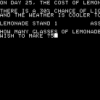I like it. Here's my take:
You're commanding an army during the age of semaphore. No radio yet, but nor do you have to send runners with orders. So you can give orders to distant squads but it still takes some time. Your assistants at HQ have to encode the messages, squads have to decode them... compared to earlier methods it seems instantaneous but there's still a practical limit of how many messages can be sent. (There's also a visual limit to the signals, so to move the front you have to also capture enemy semaphore towers and protect your own.)
Your per-turn action point unit is expressed in terms of words: your assistants can encode 25 words of orders per turn. So you can say something like "move north north, attack west". (You don't necessarily have to type this in; maybe the game infers it from where you click.) Meanwhile, each squad can only decode 8 words per turn. (This is to prevent you spending all 25 words on your Thunder God Cid unit.)
As the game progresses you get a more nuanced vocabulary, and thus can achieve more per turn than you could with only simple verbs. "Patrol" is like "move" but the path specified gets repeated until new orders are received; "reinforce" sends the unit towards another unit without having to specify the path; "retreat" allows several spaces of movement per direction specified but only away from the front, etc.




